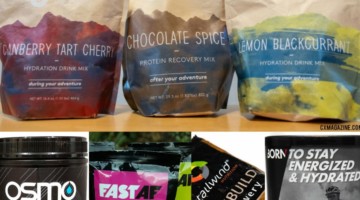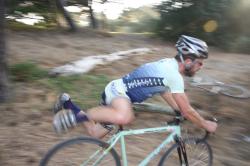Creatine is one of those supplements that you hear about with relative frequency, but what exactly is it supposed to do? Studies about the supplement have been cropping up for the last couple of years, and they all seem to have slightly differing opinions about its usefulness. It’s been suggested that creatine supplements help to reduce fatigue on muscles, improve recovery and increase muscle strength. That’s a tall order for a nitrogenous organic acid. It’s naturally produced by the body, but people add to their stores when they eat meat or take supplements. While some athletes and body-builders swear by it, studies still go back and forth with the actual effectiveness of supplementing one’s diet with creatine.
According to the University of Maryland Medical Center, an average dose is two to five grams daily, if you’re thinking about adding it to your daily supplements. However, cyclists may be wary about using creatine, as it has potential side effects including weight gain, muscle cramps, muscle strains and pulls, stomach upset, diarrhea, dizziness, high blood pressure, liver dysfunction and kidney damage. If you already experience inexplicable cramping, you may want to consider having your natural levels of creatine checked before starting a supplemental regimen, as it might be the cause of the cramping.
Today, we’re looking at a round-up of studies done on the topic to see what the experts have to say. All studies were published in the Journal of the International Society of Sports Nutrition, one of the leading sports science publications. [Ed. Note: in this article, we do not intend to suggest the effectiveness or ineffectiveness of creatine, rather, we are merely showcasing what various studies have said on the topic.]
Study #1: Creatine supplementation enhances muscle force recovery after eccentrically-induced muscle damage in healthy individuals, from the Journal of the International Society of Sports Nutrition
Why this matters for cyclists: Eccentric exercise-induced damage leads to reductions in muscle force, increased soreness and impaired muscle function. This type of exercise is the “lowering phase” during lifting (so, when the weight is coming back down), and can be translated into the way we pedal, or it can refer to cycling-specific weight training like leg presses, leg extensions or calf raises. This study focuses on people doing lower body exercises that are similar to a cyclist’s weight-training program. The aim was to see if a creatine supplement would lead to faster recovery after a session.
Results: The creatine-supplemented group had significantly greater isokinetic (10% higher) and isometric (21% higher) knee extension strength during recovery from exercise-induced muscle damage – meaning they were able to train harder, suggesting a faster recovery.
What this could mean for your training: Supplementing with creatine, according to this study, will show “a significant improvement in the rate of recovery” following training-induced “injury” (or strain) on muscles.
Study #2: Creatine-induced activation of antioxidative defense in myotube cultures revealed by explorative NMR-based metabonomics and proteomics, from the Journal of the International Society of Sports Nutrition
Why this matters for cyclists: Previously, creatine has been used for increasing muscle mass, strength and endurance. The aim of this study was to “reveal additional insight into the biochemical effects of creatine supplementation at the protein and metabolite level by integrating the explorative techniques, proteomics and NMR metabonomics, in a systems biology approach.” This study looked at creatine on a much smaller-scale level than the other studies we look at, to see how and why it works the way it does.
Results: “The explorative approach of this study combined with the determination of a decreased intracellular DCFH2 oxidation revealed an additional stimulation of cellular antioxidative mechanisms when myotubes were exposed to CMH. This may contribute to an increased exercise performance mediated by increased ability to cope with training-induced increases in oxidative stress.” This study suggests two-fold results, though it stipulates that it only may lead to them: first, creatine supplementation may lead to an increase in performance, and second, it may allow the body to better cope with training.
What this could mean for your training: For cyclists, the ability to recover is as important as the ability to train hard, and if creatine supplements can improve recovery time, then that might be a great boon for cyclists who need to pack a lot of training in to a short period of time.
Study #3: The effects of four weeks of creatine supplementation and high-intensity interval training on cardiorespiratory fitness: a randomized controlled trial from the Journal of the International Society of Sports Nutrition
Why this matters for cyclists: The study begins with the claim that “high-intensity interval training has been shown to be a time-efficient way to induce physiological adaptations similar to those of traditional endurance training.” (Meaning training hard is just as effective as training long.) Creatine supplementation may enhance the efficiency of high-intensity interval training, so the purpose of this study was to determine the effects of high-intensity interval training and creatine supplementation on cardiorespiratory fitness and endurance performance in college-aged men. In effect, the study is looking at if high-intensity interval training combined with creatine will help benefit an athlete’s endurance, which could prove helpful for cyclists with little time for longer rides.
Results: The study concludes that high-intensity interval training is an “effective and time-efficient way to improve maximal endurance performance.” The addition of creatine supplements to the athlete’s diet “improved ventilatory threshold, but did not increase total work done.” The researchers end by suggesting that creatine supplementation doesn’t further augment maximal oxygen consumption any more so than simply engaging in high-intensity interval training; however, creatine supplementation may improve submaximal exercise performance (endurance training).
What this could mean for your training: Going hard and short may be just as effective as going long, particularly when supplemented with creatine. This shouldn’t mean that you never go on an endurance ride, but if you’re pressed for time, simply getting in quality high-intensity interval training is a great way to stay at the top of your game, creatine or no creatine.
Study #4: Creatine supplementation spares muscle glycogen during high intensity intermittent exercise in rats, from the Journal of the International Society of Sports Nutrition
Why this matters for cyclists: First of all, this isn’t a study done on humans, so the theories expounded in it are, well, theoretical at best. Because the effect of creatine supplementation on glycogen content is still debatable, the investigators looked at the effects of creatine supplementation on muscle glycogen content after high-intensity intermittent exercise in rats. What is high-intensity training for rats? Swimming, as it turns out. If, at the end of the experiment, creatine supplements show that they can help avoid using glycogen stores, it could be good news for cyclists during hard races.
Results: The results showed that the supplements seemed to spare gastrocnemius glycogen content and reduce blood lactate concentration in rats submitted to intermittent high-intensity exercise.
What this could mean for your training: According to the study, and if confirmed by human studies, creatine-induced glycogen sparing could be another mechanism to explain the performance-enhancing effect of creatine supplementation in intermittent exercise. Intermittent exercise simply means short bursts of exercise followed by short rest periods, so if you’re doing interval training or even a cyclocross practice, this study suggests that creatine may boost your performance. (Or at least, if you’re a rat, you’ll be really speedy.)
Study #5: The effects of a pre-workout supplement containing caffeine, creatine and amino acids during three weeks of high-intensity exercise on aerobic and anaerobic performance, from the Journal of the International Society of Sports Nutrition
Why this matters for cyclists: This study examined the effects of a pre-workout supplement combined with three weeks of high-intensity interval training (something cyclists know a bit about!) on aerobic and anaerobic running performance, training volume and body composition. The supplement was consumed by the subjects 30 minutes prior to exercise, on an empty stomach. The supplement consisted of creatine, caffeine and amino acids. If the supplement showed any positive effect on high-intensity interval training, that could theoretically help cyclists improve things like speed work and interval training, as well as race performance.
Results: The study suggests that the ingestion of the pre-exercise GT supplement (caffeine, creatine, BCAAs, whey protein, cordyceps sinensis, citrulline and rhodiola) taken prior to high-intensity interval training for three weeks can significantly improve critical volume and total training volume when compared to the placebo group. Furthermore, it suggests that the supplement may be helpful in maintaining lean mass during intense training periods. However, which ingredient led to the results is unclear: “It is likely that the combination of relatively low doses of several ingredients may be responsible for the increases in aerobic performance, training volume and the maintenance of lean mass.”
What it could mean for your training: drinking coffee pre-race may be a good idea after all! The study suggests that a creatine supplement, when combined with caffeine, can have a potent effect on performance, and as an added bonus, may help maintain lean body mass.
Study #6: Effect of 28 days of creatine ingestion on muscle metabolism and performance of a simulated cycling road race, from the Journal of the International Society of Sports Nutrition
Why this matters for cyclists: Will creatine help you in a sprint finish? This study looked at 12 endurance trained cyclists over the course of a month as they took creatine supplements and did two hour efforts with ten second sprints every 15 minutes.
Results: According to the study, “although creatine supplementation may increase resting muscle total creatine, muscle creatine phosphate, and plasma volume, and may lead to a reduction in oxygen consumption during submaximal exercise, creatine supplementation does not improve sprint performance at the end of endurance cycling exercise.”
What it could mean for your training: Don’t count on creatine supplements to save you in a sprint!
Do you have any burning questions about sports medicine, nutrition or science? Ask away in the comments or by emailing molly [@] cxmagazine.com, and we’ll hunt down the answers you need!





























